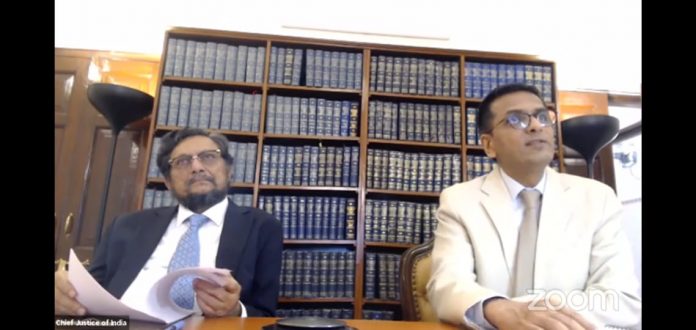The Chief Justice of India S.A. Bobde on Friday said that virtual courts were here to stay and due to the virus, the judiciary has been provided with a compulsory training to prepare for a new working environment.
The CJI was inaugurating a webinar where the e-filing module was unveiled. The module is aimed at facilitating online filing of cases on a 24×7 basis. In his address, CJI Bobde said “we are dealing with an extraordinary situation in extraordinary times and have been forced to rethink on how to function, since the pandemic’s outbreak”. The Supreme Court was the first institution to announce that it won’t function in its usual way when the threat broke and it helped to contain the spread in SC a lot. Transition to digitisation was not easy but none of this would have been possible without extreme dynamism of Justice Chandrachud, Justice Chavan, the Registrars and many others.
The online demo session was also attended by Justice DY Chandrachud, Chairperson of the E-Committee and was joined by other eminent members of the legal fraternity.
Shivaji Jadhav, President, SCAORA addressed the meeting and said that a proposal was made by SCAORA for conducting such session, and he is glad that Justice Chandrachud accepted it and the Supreme Court decided to address the virtual seminar instead. The legal fraternity is indebted for how the functioning has been continued and thanked the foot soldiers of the Registry who have been readily discharging their duty even in these tiring times.
However, according to Jadhav, consensus among the bar is that even though virtual courts are necessary, it must not replace physical hearings. We are all in this together and we will slowly and steadily get used to it.
Senior Advocate Dushyant Dave President of SCBA expressed deep gratitude on behalf of the Bar for this initiative. He said, that Bar and bench need to move side by side, to ensure justice. Present times demand greatest vigil by judiciary. Independent Bar and independent Bench form backbone of a democracy. In times of such crisis, the people of India need the healing touch of the Lordships. He informed the Judges that efforts are being made on their end as well to improvise the digitisation, and Justice Chandrachud can synergise the efforts of the e-committee with their initiatives.
Justice Chandrachud addressing the webinar stated that, the pandemic calls for robust responses and what we do today will define our future. Our assessments must be based on facts, and collaboration of all our resources.The deployment of Virtual Courts has been done by courts all over the country besides Supreme Court, under guidance of CJI. Patna High Court alone dealt with 450 cases in a day via virtual court.
Justice Chandrachud added that the key features of the model are Efficiency, transparency and access to justice by every person. The Committee aspires to be an inclusive institution and be available even to lawyers who don’t have technology accessible. The solutions will factor in the issues of lack of technological frameworks at the hand of lawyers.
He also welcomed any critical assessment as that will only help bring in improvement. He also acknowledged the efforts of the entire team that developed the E filing module by working daily even during the pandemic. We will work as an institution and ensure that no lawyer is left handicapped and the Registrar will ensure that noone faces issues in e filing.
He stated the following as the Key features of e-filing –
· It’ll be available 24 hours.
· We have envisaged online communication of defects, a digitalised scrutiny mechanism for defects and objections.
· Incorporates Court fee payment online.
· Incorporates digital signatures.
Earlier, the CJI said that “This business of e filing seems to be the first step in entire process of Courts. Some of the judges are used to it while some of us are not, including me. E filing seems to be the root and it will ensure that the system works wonderfully.”
CJI said that 3 factors have been borne in mind by us while making this model – B
· Service should ensure access to justice.
· Technology shouldn’t exclude any citizen.
· It should be inexpensive and available at low costs.
According to Chief Justice Bobde, if matters are filed through ‘e-filing’, and matter is decided by trial courts, the appellate courts will have access to all previous records. ‘E filing’ already exists, only its effect needs to be widened.
Eventually, it must settle down to a system that’s a combination of both new and old. The present situation needs to be understood and the way the court proceedings are looked at needs to change too.
“The software is being rolled out on suggestions of the Bar and for the Bar. Some difficulties may come up initially. Some frustration during the process should not make us rethink the process itself.“


